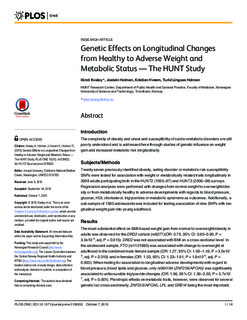Genetic Effects on Longitudinal Changes from Healthy to Adverse Weight and Metabolic Status—The HUNT Study
Journal article, Peer reviewed
Permanent lenke
http://hdl.handle.net/11250/2357505Utgivelsesdato
2015Metadata
Vis full innførselSamlinger
Sammendrag
Introduction:
The complexity of obesity and onset and susceptibility of cardio-metabolic disorders are still
poorly understood and is addressed here through studies of genetic influence on weight
gain and increased metabolic risk longitudinally.
Subjects/Methods:
Twenty seven previously identified obesity, eating disorder or metabolic risk susceptibility
SNPs were tested for association with weight or metabolically related traits longitudinally in
3999 adults participating both in the HUNT2 (1995–97) and HUNT3 (2006–08) surveys.
Regression analyses were performed with changes from normal weight to overweight/obesity
or from metabolically healthy to adverse developments with regards to blood pressure,
glucose, HDL cholesterol, triglycerides or metabolic syndrome as outcomes. Additionally, a
sub-sample of 1380 adolescents was included for testing association of nine SNPs with longitudinal
weight gain into young adulthood. Results:
The most substantial effect on BMI-based weight gain from normal to overweight/obesity in
adults was observed for the DRD2 variant (rs6277)(OR: 0.79, 95% CI: 0.69–0.90, P =
3.9x10-4, adj. P = 0.015). DRD2 was not associated with BMI on a cross-sectional level. In
the adolescent sample, FTO (rs1121980) was associated with change to overweight at
adulthood in the combined male-female sample (OR: 1.27, 95% CI: 1.09–1.49, P = 3.0x10-
3, adj. P = 0.019) and in females (OR: 1.53, 95% CI: 1.23–1.91, P = 1.8x10-4, adj. P =
0.003). When testing for association to longitudinal adverse developments with regard to
blood pressure, blood lipids and glucose, only rs964184 (ZNF259/APOA5) was significantly
associated to unfavourable triglyceride changes (OR: 1.66, 95% CI: 1.36–2.03, P = 5.7x10-
7, adj. P = 0.001). Pleiotropic effects on metabolic traits, however, were observed for several
genetic loci cross-sectionally, ZNF259/APOA5, LPL and GRB14 being the most important. Conclusions:
DRD2 exhibits effects on weight gain from normal weight to overweight/obesity in adults,
while, FTO is associated to weight gain from adolescence to young adulthood. Unhealthy
longitudinal triglyceride development is strongly affected by ZNF259/APOA. Our main finding,
linking the DRD2 variant directly to the longitudinal weight gain observed, has not previously
been identified. It suggests a genetic pre-disposition involving the dopaminergic
signalling pathways known to play a role in food reward and satiety linked mechanisms.
